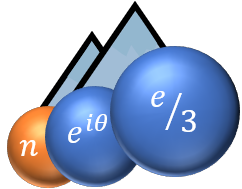We address the problem of the equilibration of quantum Hall (QH) edge states under the constraint of charge conservation.This problem applies generally to any chiral quasi-one dimensional states, but it naturally arises in the context of resent experiments with quantum Hall systems. This is because QH edge states carry charge excitations with approximately constant speed, and in a typical mesoscopic experiment, to finite distances. Therefore, edge states dynamics must depend on the initial (generally) non-equilibrium state via boundary conditions. Thus, even in the case of a strong coupling of edge states to the bath of neutral excitations, their complete equilibration is not possible at finite distances. In order to investigate the equilibration process under such conditions, we propose the model describing QH edge state as a chiral bosonic channel strongly coupled to an array of identical Ohmic reservoirs with small capacitances. Such model effectively describes a chiral one-dimensional charged channel with dissipation. Asymptotically close to the equilibrium state, the electron distribution function acquires an almost equilibrium form with the universal corrections in the form of deformations of the equilibrium distribution, which decay as power-law functions of the distance from the point, where a non-equilibrium state is created.
- Poster

 PDF version
PDF version

